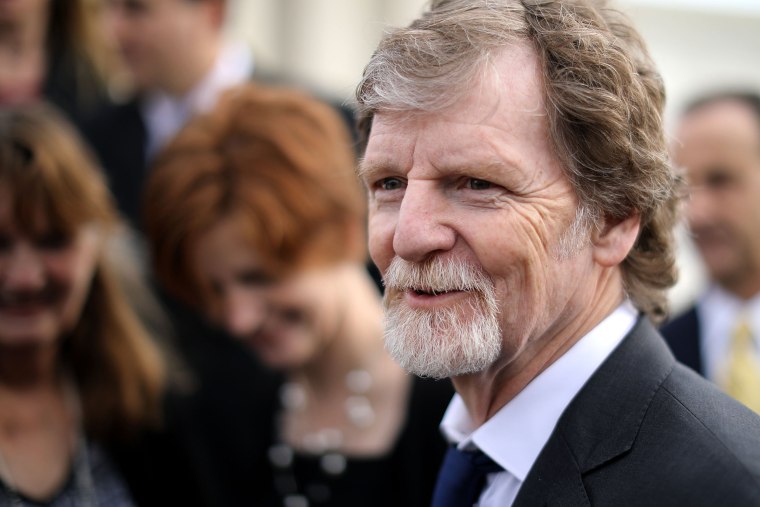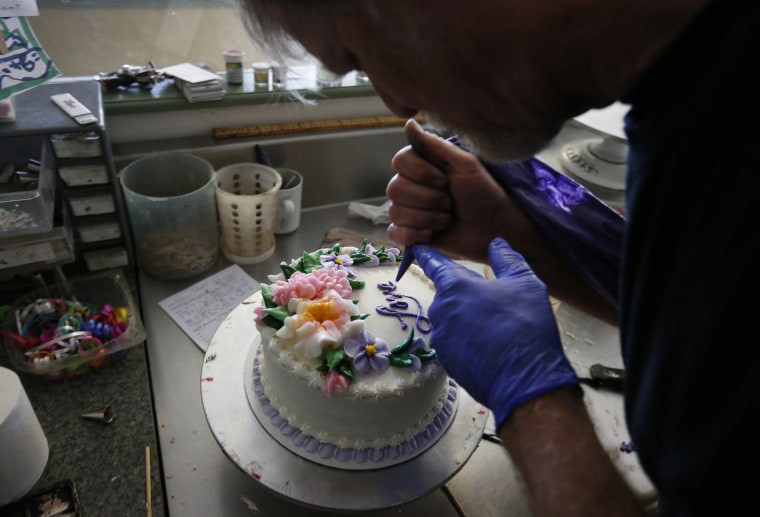Legal analysts have rightly noted that Monday’s Supreme Court ruling in Masterpiece Cakeshop v. Colorado Civil Rights Commission was narrow — though that’s not a reference to the 7-2 count (with Justices Breyer and Kagan joining the Court’s five Republican nominees). Instead, the ruling that Colorado violated the rights of a man who refused to bake a cake for customers based on their sexual orientation has explicitly limited applicability, and was based on the peculiarities of the case.
Nonetheless, it presents a serious risk of undermining civil rights law in the name of religious freedom, especially given that it invites yet further suits for the court to consider, and will be interpreted by federal courts that Trump is making significantly more conservative through his appointments.
Jack Phillips, the plaintiff in the case, refused to bake a cake selected from his catalog by Charlie Craig and David Mullins once he found out that it would be used for their same-sex wedding ceremony. The couple sued under Colorado civil rights law, which prohibits public accommodations (like a bakery) from discriminating on the basis of sexual orientation. The Colorado Civil Rights Division and Commission both sided with Craig and Mullins, and the Colorado courts upheld the decision the state’s civil rights adjustors. Phillips appealed to the Supreme Court, who agreed to take the case.
It invites yet further suits for the court to consider, and will be interpreted by federal courts that Trump is making significantly more conservative through his appointments
The brief filed by the Trump administration’s Department of Justice on behalf of Phillips focused on the argument that the application of Colorado’s civil rights law in this case violated Phillip’s freedom of speech rights under the 1st Amendment, by forcing him to express a message he disagreed with. The free speech argument persuaded just two justices: Justice Clarence Thomas and Trump nominee Neil Gorsuch.
Justice Kennedy’s majority opinion, however, ruled based on a different clause of the First Amendment — the clause protecting the “free exercise of religion.” That argument, though, was not an easy lift legally because, under the 1990 case Employment Division v. Smith, regulations of conduct that incidentally burden religious freedom do not violate the free exercise clause unless they are deliberately targeted at a religious group.
While, as Gorsuch observed in a concurrence joined by Justice Alito, “Smith remains controversial in many quarters,” the logic behind the opinion was sound, and the majority opinion today did not overrule it.

Since nobody claimed that Colorado’s decision to protect people from discrimination on the basis of sexual orientation was targeted at religious groups, the basis for the Court’s ruling was that Phillips was the victim of the discriminatory application of an otherwise neutral law. Colorado’s civil rights law did not violate Phillips’s rights, in other words, but the decision to apply in this case did.
Kennedy’s opinion cited two factors. First, he compared Philips’s case with the case of William Jack. In what was essentially an act of trolling in response to the state supreme court decision favorable to Craig and Mullins, Jack asked bakers to bake cakes with disparaging messages about same-sex marriage. When the bakers refused, Jack sued, but the Colorado Civil Rights Commission granted the bakers an exemption, finding that their refusal was not based on religious hostility but on the basis of their disagreement with the content of the message Jack wanted to conclude. To a majority of the Court, the differential treatment of Phillips and Jack was evidence of anti-religious animus the First Amendment forbids.
But as Justice Ginsburg — whose dissent was joined by Justice Sotomayor — pointed out, this argument is not at all convincing given all the facts. Had Craig and Mullins requested a custom cake with a specifically pro-same-sex marriage message, the Phillips and Jack cases would be comparable. But they didn’t: Rather, as Ginsburg says, “Phillips would not sell to Craig and Mullins, for no reason other than their sexual orientation, a cake of the kind he regularly sold to others.” Jack was a refused a service the bakers would not provide anyone; Craig and Mullins were refused service Phillips was willing to provide to heterosexual couples but not same-sex ones because “the offensiveness of the product was determined solely by the identity of the customer requesting it.”
There remains the possibility that this apparently narrow ruling will help conservative courts significantly undermine the enforcement of critical civil rights statutes.
The latter is precisely the kind of discrimination civil rights law forbids, and the comparison with the Jack case is not at all convincing.
Another factor cited by Kennedy in his ruling was the arguably anti-religious statements made by two members of the Civil Right Commission during Phillips’ initial hearing. But even here, there was dispute among the Court’s majority about whether the comments were relevant; Thomas and Gorsuch’s concurrence argued that “[a]lthough the Commissioners’ comments are certainly disturbing, the discriminatory application of Colorado’s public-accommodations law is enough on its own to violate Phillips’ rights.” (Notably, it is hard not to read this justification for the comments as the two justices signaling their agreement with the argument made by Trump supporters that Donald Trump’s frequent expressions of anti-Muslim bias shouldn’t prejudice the court’s understanding of the “Muslim ban.”)
Still, as Ginsburg observed, there was no evidence of systematic religious bias by all of the individuals on the commission, and the application of civil rights law to Masterpiece Cakeshop is legal on its face. Its decision should have been upheld.
If there is a silver lining to this outcome, it’s that Kennedy’s ruling is much narrower than the free exercise ruling sought by the Trump administration would have been. It is possible that this decision was a result of an unusual set of facts and will not have a great deal of significance going forward. But — particularly given the specious comparison between the Phillips and Jack cases — there’s also the possibility that this apparently narrow ruling will help conservative courts significantly undermine the enforcement of critical civil rights statutes in future cases brought by the religious right.
Scott Lemieux is a lecturer in the Department of Political Science at the University of Washington. He is the co-author of Judicial Review and Democratic Theory and contributes regularly to The Week, Reuters, and the New Republic.

